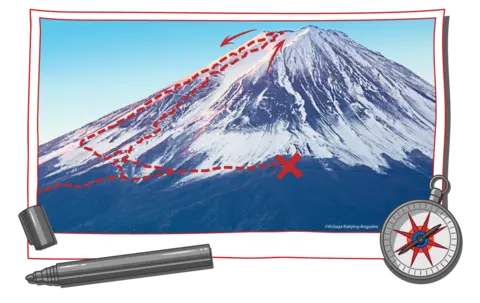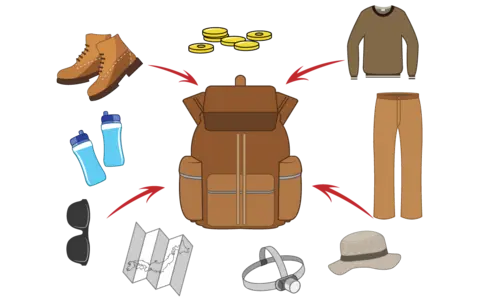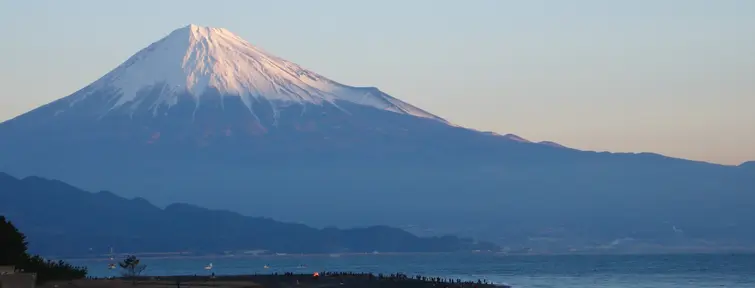Mount Fuji Expedition
An emblematic symbol of Japan, Mount Fuji can be admired from various points of view throughout the year. But when summer comes, the bravest can tackle the slopes of this 3,776-meter active volcano.
Even if it is an experience accessible to all, subject to unfailing motivation, the ascent of Mount Fuji cannot be improvised. You will have to leave ready to face extreme conditions, because the mountain is capricious. A Japanese proverb even says: "He who climbs Mount Fuji once is a wise man, he who does it twice is a madman".
Every year, the Mount Fuji climbing season lasts from early July to early September. The trails and refuges are closed during the rest of the year because the weather conditions do not allow a safe climb (even if no one will come to prevent you from climbing!). However, some refuges remain open until mid-September, which can be a good alternative to escape the crowds of nearly 300,000 climbers who embark on this crazy expedition each summer. Also try to avoid weekends and Japanese holidays and holidays. If you are not lucky enough to be in Japan during the ascension period, you can still go to one of the 5th stations served by public transport throughout the year. You can even walk there !
- Read also : When to climb Mount Fuji?

Choose your route to climb Mount Fuji
For the ascent you will have the choice between four different paths to reach the summit, depending on your abilities, your equipment and the experience you want to live.
The busiest and most beginner-friendly route is the Yoshida Trail. It starts at 2,305 meters above sea level and is easily accessible by bus from central Tokyo but also from Nagoya. You will find many refuges and supply points during the ascent. But on certain days during the summer, you literally have to queue to reach the summit, so many apprentice mountaineers are embarking on the adventure!
If you climb in two stages to admire the sunrise, you can rest for a few hours in one of the refuges set up at the seventh and eighth stations. One of the advantages of this route is that it takes you two totally different paths for the ascent and descent.
Allow a maximum of six hours to reach the summit and around three hours to return to the 5th station

Know how to prepare for the adventure
Be sure to bring with you the necessary equipment for climbing Mount Fuji. It's not a walk in the park you can do in sandals, shorts and a T-shirt! Even if brave people of all ages reach the summit without too much difficulty, the journey cannot be improvised. Clothes, shoes, provisions, headlamp, change to pay for the toilets... You have to think of everything!
Some shelters take reservations so if you are afraid of not having a place to sleep and that the possibility of spending the night outside does not please you, consider planning ahead.
If you are unfamiliar with mountain air, be aware that oxygen cylinders are available at the various stations in case you have difficulty breathing.
Respect the sacred mountain
Mount Fuji is part of the Fuji-Hakone-Izu National Park , so nature reigns supreme and you'll have to be careful not to break any rules. Obviously, it is forbidden to touch animals and plants that live peacefully on the slopes of the volcano.
- Read also: the three little-known caves of Mount Fuji
Similarly, each stone must remain on the ground. If you want to bring back a souvenir, you can take photos or send a postcard to the summit.
As in many places in Japan, trash cans are scarce, so remember to bring a small bag to take your rubbish with you.
- Read also: Mount Fuji World Heritage Center in Shizuoka
Things to do around Mount Fuji
The ascent is a once-in-a-lifetime experience, but to appreciate the magnificence of the volcano, you can also simply take excursions in the region.
The surroundings are full of walks, towns, villages and activities not to be missed, such as the town of Fujinomiya .
- Read also: 7 anecdotes about Mount Fuji
Perhaps the most popular attraction is Fujigoko , or "the 5 lakes of Mount Fuji". Each of these sites will offer you an incredible panorama and a breathtaking view of the sacred mountain.
If you need thrills, head to Fuji Q Highland, an amusement park very popular with the Japanese.
Finally, you won't have fully enjoyed Mount Fuji if you don't dive in an onsen with a view of Japan's highest peak. Sleep in a ryokan near Hakone and let yourself be overwhelmed by the beauty of the landscape.
- Read also: Five onsen with a view of Mount Fuji
For further :
- Admire the sunrise and sunset at Mount Fuji
- When to climb Mount Fuji?
- 10 things not to miss in Mount Fuji
- Where to sleep on Mount Fuji?
- Mount Fuji in history, culture and art
- 7 facts about Mount Fuji
- Mount Fuji: a geological marvel
